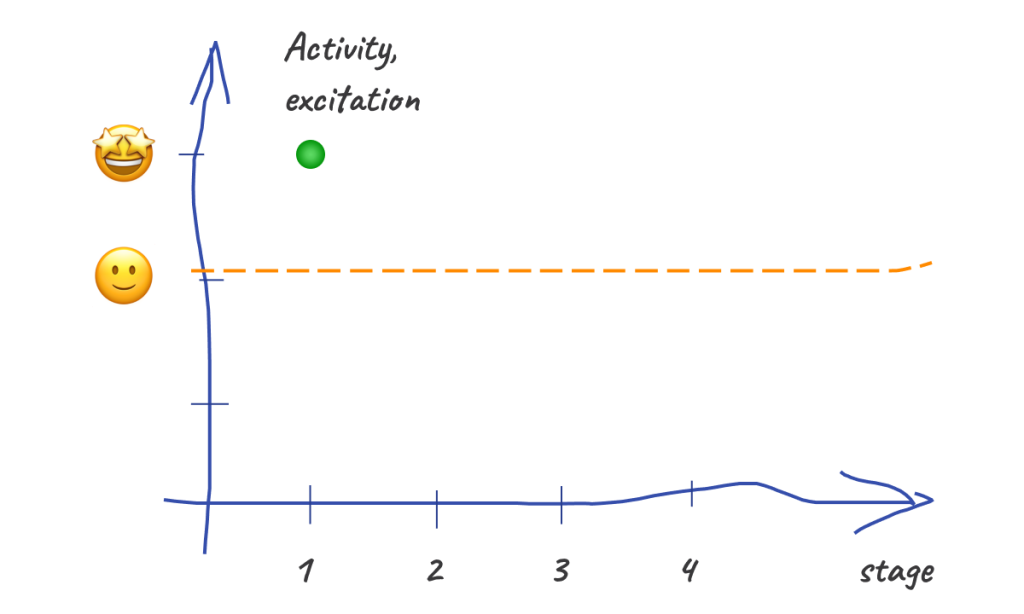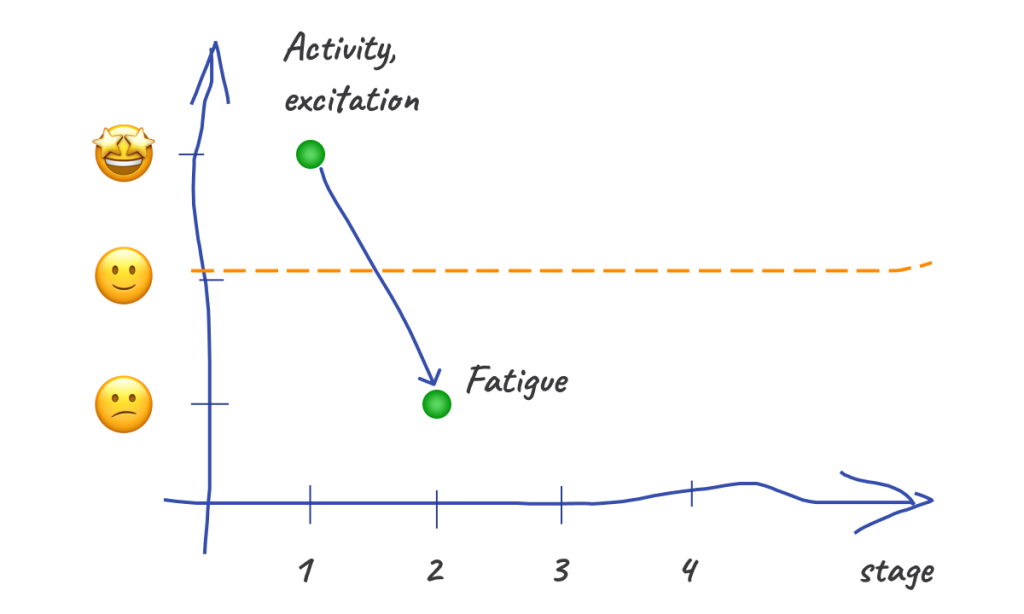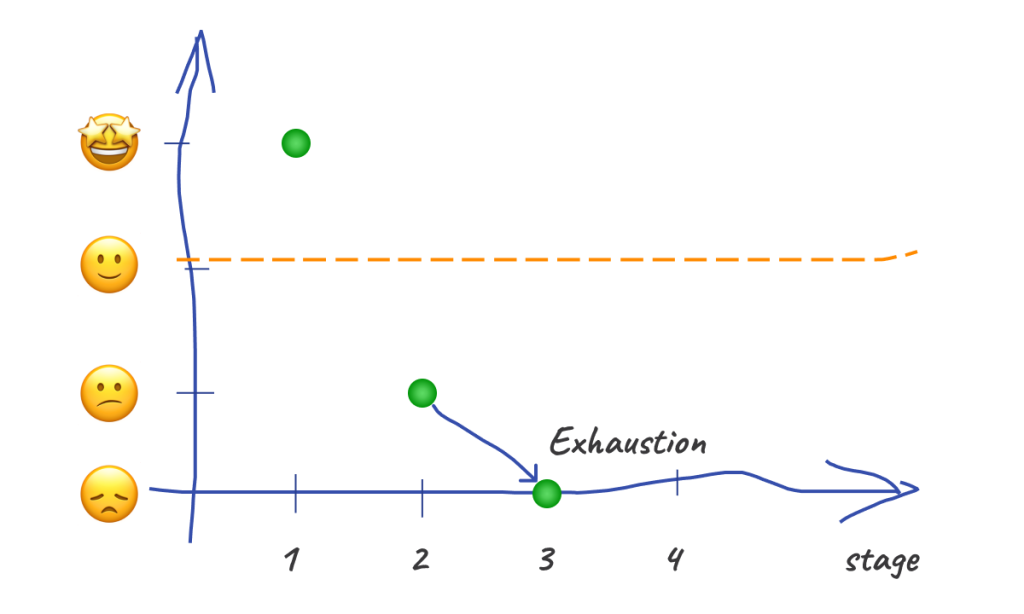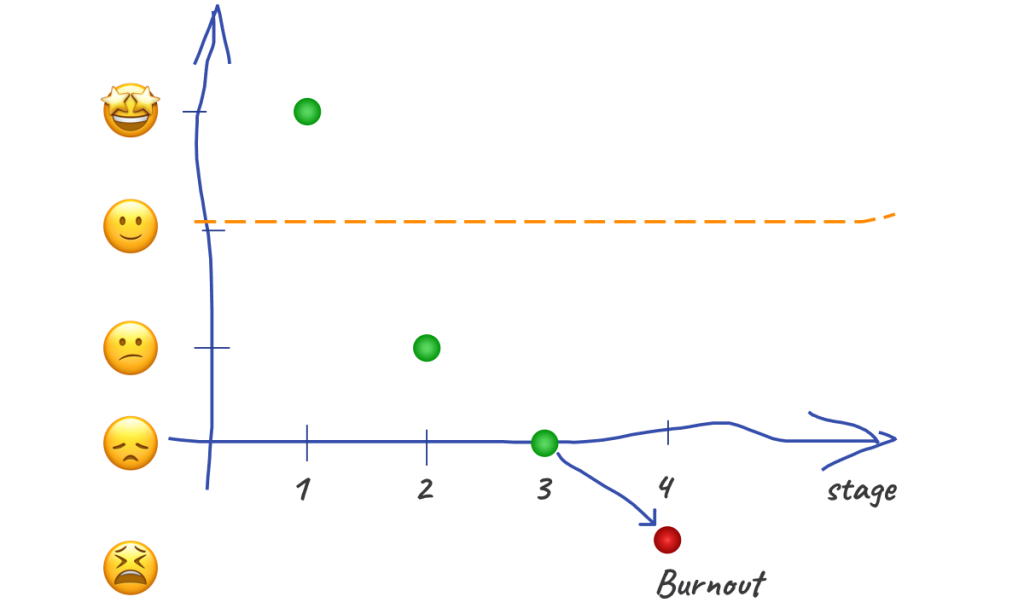What does every recruiter need to know to avoid burnout?
In the United States, 73% of recruiters and HR complain of uncontrollable professional burnout, and for this reason, 61% have changed jobs in the past year. These shocking figures are listed in the results of the survey “State of Hiring and Recruiting Report 2023” conducted by Findem and KarmaCheck. Routine, constant tension, time pressure, difficulties in teamwork, large flow of people with whom you need to communicate, and not always positive feedback from the customer or manager – all this takes a lot of energy and creates the basis for emotional exhaustion. But is it possible to work without burning out? How can you recognize the first symptoms of burnout and how can you help yourself in this case? Let’s analyze this topic “in detail” with the psychologist Daria Selivanova and look at it from non-obvious angles. Let’s go 🙂

What is a burnout?
Professional burnout is a state of physical and emotional exhaustion that can occur in people who work in stressful conditions for a long time, or perform a job that requires a high level of emotional and psychological stress.
In the 1970s, American psychologists Christina Maslach and Herbert Freudenberger studied workers in various professions who felt excessive stress and overpressure at work, and noticed that some of them often experienced feelings of exhaustion, cynicism and professional dissatisfaction. To describe this condition they offered the term “professional burnout” and different approaches to its measurement and treatment.
“Every employee realizes that stress can become a fire of joy from work. But if an employee does not have enough resources to manage and control this fire, he or she may “burn out”…”
Herbert Freudenberger
How to recognize professional burnout?
The symptoms of professional burnout can be individual. However, the most common ones are the following:
- feelings of exhaustion and fatigue, both physical and emotional;
- difficulty concentrating;
- increased irritability and nervousness;
- decreased motivation and productivity at work;
- feelings of cynicism and alienation from work, colleagues and customers;
- loss of interest and job satisfaction;
- feelings of helplessness, anxiety, worry and depression;
- self-criticism and feelings of worthlessness, meaninglessness and loss of self-respect;
- expectation of rest, days off, even at the very beginning of the work week.
All of the symptoms described above reflect changes in a person’s emotional sphere. But it is not always possible to notice and recognize it. Reflection of the personal emotional state is a skill that not everyone has.
A simple experiment for self-diagnostics. Write on paper the names of all the feelings and emotions you know. All of them! Then google what they are and compare the lists. Often, as a result, it turns out that a person seems to know all the names that are found on Google, but they do not come to mind alone, without prompting. This indicates a lack of habit of paying attention to own emotions, or an inability to name a particular emotional state. That means, with a high probability, the beginning of burnout can be missed.
Important! I strongly recommend to write your list at first, and only then to look for information on the Internet, otherwise you will get the “right” answer, but you will not get such valuable information about yourself.
Burnout can also be recognized by a person’s actions or behavior. How exactly? If you notice any of the following:
- being late for work;
- delaying with the projects deadlines;
- slower communication (not wanting to answer letters, phone calls);
- reluctance to start new projects, even if they are extremely profitable;
- conflicts with colleagues and management;
- tearfulness;
- avoidance of meetings, the desire to “keep silent”;
- emotional outbursts at home, at loved ones;
- increased illnesses, including headaches, sleep problems and immune system related illnesses;
- abuse of alcohol or other substances.
It is important to note that such changes must not have been peculiar to you before. That is you can remember a period in your life when there were no such manifestations. Then their appearance can really be correlated with burnout. If some procrastination or conflictedness has always been peculiar to you, you should consider them as separate problems. But you cannot correlate them with a burnout.
If you have doubts, we suggest you to pass a special test to find out how much you are subject to a burnout at the moment.
Stages of burnout
Now let’s talk a little bit about the existing stages of burnout. The majority of researchers distinguish 4 stages:
- It can be conditionally called “optimistic”, because there are no unpleasant feelings yet. On the contrary, there is enthusiasm for work, frequent overtimes, work takes much time and place in life. This stage is also called “work addiction”.

- Fatigue. So far it is just a drop in productivity and a lack of energy. And here is one of the news on burnout that most researchers do not write about. It is not always necessary to simply “rest” to stop the development of burnout. But we will talk about that later when we discuss “what’s wrong with the idea of work-life balance”.

- Exhaustion. Here you simply do not have enough resources to cope with the work tasks. At this stage, burnout becomes obvious to everybody: both to the person himself/herself and to his/her surroundings. The symptoms described above become strongly pronounced. A person wants to be left alone and untouched.

- Complete burnout, refusal of activity. At this stage a person begins to avoid work, takes a vacation, a sick leave and can quit his/her job.

What is wrong with the idea of “work-life balance”?
There is the idea that work and life should be in some kind of balance, and if they are not, problems will arise. I do not like this idea at all. It invisibly gives you the idea that work is not a part of your life, thereby creating a negative emotional attitude toward professional activities.
It may not show up right away, but with some problems and difficulties you will have the thought, “Why am I so worried, it is just a work?” Like, this area of life should not be so important. You can tell me: “Well, what’s wrong with that? Are you trying to turn us into workaholics?” Not at all. I am just for the fact that different areas in life are important: relationships with loved ones (parents, family, friends), sports, self-development. But work is also an important, integral part of a person’s life, which can be a source of many pleasant experiences and pleasure.
When we separate work from life in our minds, we form the following problems:
- Ignoring unpleasant emotional experiences related, for example, to failures or conflicts at work. A person does not try to deal with his/her emotions, he/she tries to ignore them, because it is “just a work”. This deprives him or her of opportunities for development and personal growth, and in the global long term can lead to burnout and health problems.
- Unwillingness to make efforts and overcome difficulties. If it is “just a job”, why should I bother?
- Inability to feel pleasant experiences that are only possible at work. For example, the feeling of connectedness with your colleagues, the feeling that you are doing the same thing, the confidence in your own abilities after implementation of difficult projects, and so on. If it is “just a work”, there is no point in looking for pleasure in what you do. It should be sought “in life”, and work is not part of it.
- Deprives you of career ambition and the opportunity to become a super-professional in your business.
Definitely, there are times when it is worth paying attention to the balance between work and another part of your life. Sometimes work takes up a lot of time in your life because you lack the skill to self-structure, delegate, there are some difficulties in other areas of life, and then work becomes an “outlet”. But in each of these cases it is worth to sort out, maybe something is worth to work on or change, but definitely do not blame everything on your love for work.
Why can burnout occur?
- Very often burnout is associated with violation of this very balance. Is that true? There are times when a person really has not been on vacation for a long time, is tired, and needs to switch over. But this is only one of the possible causes of burnout.
- Inability to assert own interests. Very, very often a person’s dissatisfaction caused by the fact that he/she cannot organize the work process the way he/she would like it, is at the heart of the burnout. For example, he/she agrees to duties he/she does not like, to an unsuitable work schedule, a smaller role in the team, insufficient salary, etc. This happens because he/she is afraid to ask, to talk about his/her needs, to assert his/her point of view. Sooner or later, this dissatisfaction will accumulate and can lead to burnout.
- Conflicts – latent and overt. If you strongly dislike your colleagues and have to constantly communicate with people who are unpleasant to you, this will also affect your attitude to work in general.
- Personal emotional peculiarities. For example, the desire to please everyone, to be good, excessive anxiety, fear of evaluation, and many other things.
- A sincere desire to do something else.
- Attitudes about what the work should be (hard, permanent, prestigious, etc.).
It becomes clear why burnout is more common for recruiters and other people who are in close contact with people. It is in constant contact that all the above-mentioned points become more acute. If you work with numbers like an accountant, you do not have to learn to conflict with them, or worry about how you will be evaluated by the new code you, as a developer, write.
Can there be burnout in a team?
Of course it can. All the same rules that we described above will also be peculiar for the team. Correspondingly, we will observe all the same symptoms, but in a group of people at once.
Usually, employee’s burnout is primarily related to the burnout of the manager. For various reasons, he or she may become uninterested in what his or her employees need. And this, like a snowball, will eventually lead to dissatisfaction of the employees.
There is also a style of management focused on short-term benefits: then people are simply used as “expendable material”, replacing those who have burned out with “newcomers”. This also leads to burnout, but there is only one way to deal with it: not to work in such companies or work with a clear understanding of your goals and deadlines.
If you are a manager and you feel burnout, you have to understand that it is a matter of time before your team notices it. That is why it is crucial for you to monitor your emotional state and take measures to normalize your state as early as possible.
How do you delicately help a colleague if you see that he/she is not doing well (especially if your joint work, the overall result, is suffering)? The optimal way is to gently lead him/her out to talk about what is going on with him/her. Use the 2 simplest but most effective questions: “How are you? And how can I help you?” Avoid criticizing his/her condition, rebuking him/her, or commenting on the problems you see in him/her.
How do you cure a burnout? Questions for self-analysis
The first step is to correctly determine your own stage of burnout. You can try to cure the first and second stages on your own. But if a person is on the third stage, they will most likely need professional help from a psychologist. If we are talking about the fourth stage, it may be necessary to add more support with vitamins or other medications. But here it is worth consulting not only a psychologist, but also a doctor.
The second step is to normalize sleep and rest patterns. As trivial as it may seem, you need to sleep enough hours, eat a variety of foods and be out in the fresh air, not forgetting about physical activity. If you already intend to skip this point, thinking about how boring it is, be sure to put at least one nuance in your plan that is worth fixing. We have a habit of ignoring the obvious. And it can be extremely important.
The next step is to diagnose the factors that provoke burnout. We have mentioned above that the causes can be different. As an option, you can try to perform a self-analysis by answering the following questions:
- When was the last time I felt inspired to work?
- How long ago did I take a rest?
- How long was my vacation?
- Did I turn my phone off or did I stay in touch?
- Do I have difficulty asserting my interests?
- If I work in this rhythm/condition for another year, five, seven years, will I be comfortable?
- Is there anything I need to change right now?
- Do I have any open/hidden conflicts?
- Do I know how to solve them?
- What are my main strategies of behavior in conflict?
- How much do I suffer from “imposter syndrome” (doubting my right to engage in this activity, to hold this position, etc.)?
- Am I able to appropriate my achievements and accept praise?
- Do I tend to worry about mistakes for a long time and constantly worry for fear of committing them?
- Am I dependent on approval of my manager? Colleagues? Clients?
- Do I want to develop in this profession? Work in this field in ten years?
- If I had a lot of money, what would I do?
- What do my parents work as?
- What did they want me to be?
- What do I think a normal job should be?
Well, the last rule is to try to do the square technique. Namely, draw a square with four segments below:
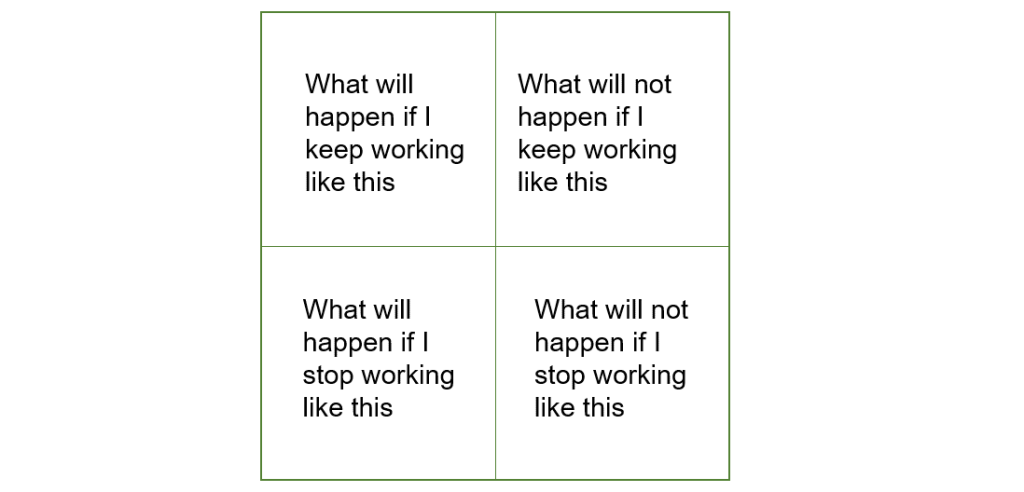
What can be a burnout prevention?
Firstly, periodically self-diagnose your emotional state at work. Make a habit of assessing every Monday how much you want to go to work, and every Friday whether you have a feeling of satisfaction with how your working week was. You can make a spreadsheet where you give yourself a score.
Secondly, ask people close to you at work and at home to signal you if they see any red flags. You can have a code phrase, something like “our flowers are starting to wilt”, and let it be a sign that you need to stop and pay attention to your emotional state.
Thirdly, save our article and come back to read it whenever you feel wrong. I would consider it a huge accomplishment if after reading this article you get 2-3 ideas that you want to think about and maybe change something in relationship with your work. It is possible that in six months or a year you will have other issues. Then you can open it again and have another read of it.
And remember, work is a huge part of your life that you can and should enjoy. We are absolutely sure of it 🙂
We are grateful to Daria Selivanova and the Psychological Center “Don’t Panic” for preparation of this article.
